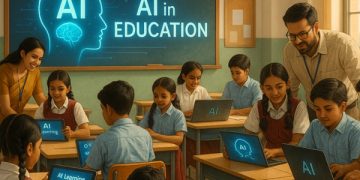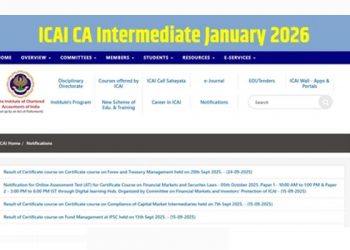India’s education system is undergoing a major shift, moving from rote learning to skill-based, technology-driven education. Schools are increasingly introducing courses in AI, coding, and drone technology, in line with the National Education Policy (NEP) 2020. But a key question persists: Are teachers equipped to lead this transformation?
The Rise of Skill-Based Learning
As classrooms embrace coding, AI tutors, and drone experiments, students are exploring real-world skills such as digital marketing, problem-solving, and creative design. With a growing emphasis on experiential learning in Classes 11 and 12, the future of education is becoming tech-driven and highly personalised.
However, surveys show that only 47% of schools offer skill-based courses for Grades 9 and above. Limited teacher training, insufficient infrastructure, and lack of resources remain major barriers. “Without robust teacher support, even well-intentioned initiatives risk falling short,” says Monica Malhotra Kandhari, Managing Director at AASOKA.
Hands-On Learning in Action
Some schools are already experimenting with innovative programmes. In Gurugram, students are coding mini-robots and testing drone flight patterns during enrichment sessions. In Pune, learners are designing mobile apps under guidance from industry mentors.
Maharashtra has also launched India’s first AI-powered anganwadi in Waddhamna village, Nagpur district. Equipped with VR headsets, AI-enabled smartboards, and tablets, the centre allows children to learn poems, songs, and basic concepts digitally, bridging the rural-urban digital divide.
Despite these examples, such programmes remain rare. “We need more schools, especially in Tier 2 and Tier 3 cities, to adopt this model,” notes Alka Verma, Resident Director at Zamit, a global SkillTech organisation.
Teachers: The Critical Link
While over 90% of secondary teachers have received some professional training, many feel unprepared to teach AI, robotics, or drone technology. Experts highlight the need for continuous re-skilling to move from rote methods to problem-solving, design thinking, and collaborative learning.
Infrastructure is another challenge. Even urban schools often lack modern labs and reliable internet, while rural areas face greater gaps in digital access.
Government Initiatives and Future Steps
To address these gaps, the Delhi Cabinet approved a Rs 900-crore plan to install nearly 19,000 smart boards in government schools over five years, alongside teacher training modules. Such investments signal progress, but scaling skill-based learning nationwide remains a formidable task.
Experts emphasise a multipronged approach: continuous teacher training, industry collaboration for mentorship, infrastructure upgrades, and competency-based curricula that focus on practical skills and project-based learning.
Looking Ahead
The shift to skill-based education represents more than a new curriculum—it is a transformation in teaching, learning, and mindset. With careful planning, robust support, and continuous training, India has the opportunity to create a generation not only ready for exams but equipped for life in a technology-driven world.





























































